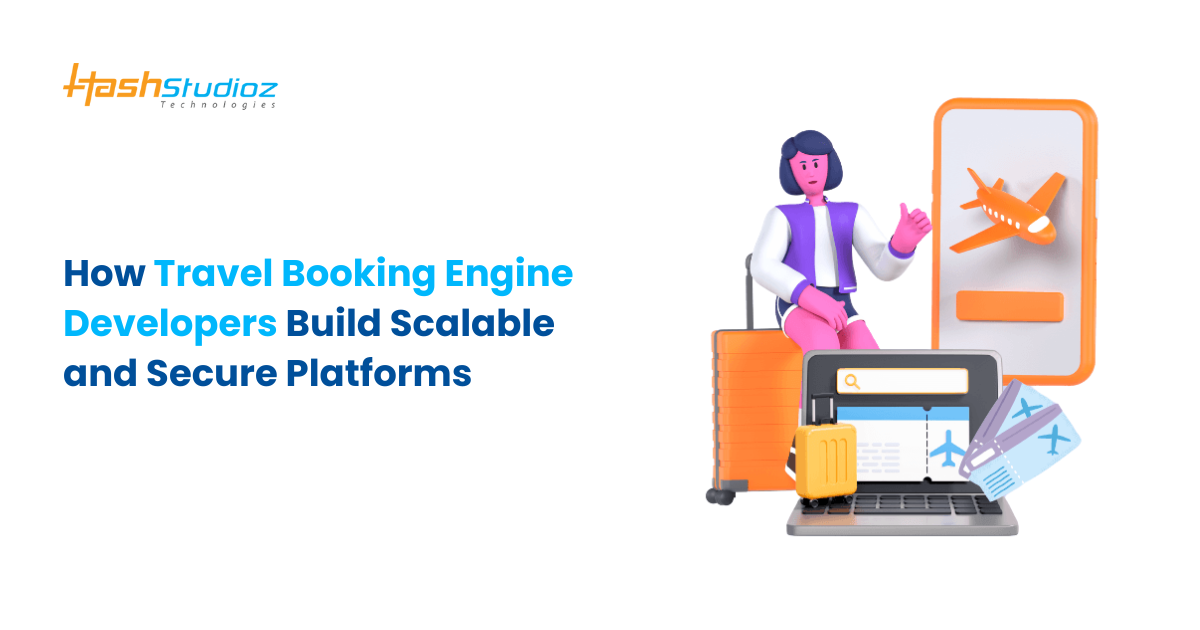science-technology

March 28,2025 • 5 min read
How Travel Booking Engine Developers Build Scalable and Secure Platforms

The modern travel industry thrives on seamless digital experiences. Behind every reliable flight search, hotel reservation, or vacation package lies a complex software architecture designed and maintained by a Travel Booking Engine Developer. As digital demands surge, ensuring the scalability and security of these platforms becomes a cornerstone for operational success.
Who is a Travel Booking Engine Developer?
A Travel Booking Engine Developer is a software professional specialized in designing, developing, and maintaining applications that power online travel agencies, tour operators, hotel chains, and airline booking systems.
Key Responsibilities:
-
Building custom booking platforms
-
Integrating third-party APIs (GDS, payment gateways, etc.)
-
Ensuring high performance under peak load
-
Implementing top-grade cybersecurity features
-
Offering real-time updates and multi-platform access
Why Scalability and Security Matter in Travel Booking Engines
Scalability: A scalable travel booking engine ensures uninterrupted service regardless of user volume. As a business grows or experiences seasonal traffic spikes, the platform must respond efficiently.
Impacts of Poor Scalability:
-
Website crashes during peak periods
-
Long response times
-
Customer dissatisfaction and revenue loss
Security: Security is non-negotiable in handling user data and financial transactions. A Travel Booking Engine Developer must mitigate potential risks like data breaches, phishing attacks, and fraud.
Risks of Weak Security:
-
Financial loss due to data theft
-
Regulatory penalties for non-compliance
-
Reputational damage
Key Elements of a Scalable Travel Booking Engine
1. Microservices Architecture
Travel Booking Engine Developers often use microservices to break down the booking engine into independent modules—making it easier to scale specific functions like flight search or payments.
2. Cloud Infrastructure
Scalable platforms use cloud-based hosting (AWS, Azure, Google Cloud) to auto-adjust server capacity based on traffic.
Benefits:
-
Elastic resource allocation
-
Global availability
-
Cost efficiency
3. Load Balancing
To distribute network traffic effectively, developers use load balancers that direct user requests to the least loaded servers.
4. Caching Mechanisms
Caching frequently accessed data (like popular destinations) improves performance and reduces server load.
5. Database Optimization
Developers use NoSQL or distributed SQL databases that handle large volumes of concurrent read/write operations.
Security Strategies Implemented by Travel Booking Engine Developers
1. SSL Encryption
SSL certificates ensure encrypted communication between users and the server, protecting personal and financial data.
2. Secure Payment Gateways
Integration with PCI-DSS compliant payment systems (like Stripe, PayPal, Razorpay) is crucial for transaction security.
3. Role-Based Access Control (RBAC)
Developers assign user roles to control access, ensuring only authorized personnel can manage sensitive areas.
4. Two-Factor Authentication (2FA)
Adding 2FA protects customer accounts from unauthorized logins.
5. API Security
APIs are fortified using API gateways, authentication tokens, and rate-limiting to prevent misuse or attacks.
6. Regular Penetration Testing
Routine security audits and vulnerability scans help identify weak points before exploitation.
Tools and Technologies Used for Building Scalable and Secure Platforms
Backend Technologies:
-
Node.js, Python, Ruby on Rails, Java
-
Express.js or Django for REST APIs
Frontend Frameworks:
-
React, Angular, or Vue.js
-
Responsive design tools for mobile optimization
Databases:
-
MongoDB, PostgreSQL, Cassandra, Redis
Cloud Platforms:
-
Amazon Web Services (AWS)
-
Google Cloud Platform (GCP)
-
Microsoft Azure
Security Tools:
-
Cloudflare (DDoS protection)
-
Let’s Encrypt (SSL)
-
Auth0 (Authentication management)
-
OWASP tools (for secure coding practices)
Challenges Faced by Travel Booking Engine Developers
-
Real-Time Data Synchronization: Syncing live availability and pricing from multiple sources in real-time without lag.
-
Third-Party API Limitations: Handling inconsistencies or downtime from external providers like GDS (Amadeus, Sabre).
-
Data Privacy Compliance: Navigating global privacy laws like GDPR, CCPA while managing international users.
-
Performance Under Load: Preventing crashes during holiday seasons or flash sales.
Conclusion
A Travel Booking Engine Developer plays a critical role in the success of digital travel platforms. By leveraging advanced technologies, scalable architectures, and robust security practices, they create systems that not only perform well under pressure but also inspire trust among users. Whether you're a startup launching a niche travel portal or an enterprise expanding globally, investing in the right developer expertise is the first step toward a reliable, secure, and future-ready booking engine.
FAQs
Q1: What makes a Travel Booking Engine Developer different from a regular web developer?
Travel Booking Engine Developer specializes in handling real-time data integration, API connectivity, booking logic, and secure payment systems—features essential for travel portals.
Q2: Why is scalability so important in travel booking engines?
Scalability ensures your platform can handle high volumes of users without crashing or slowing down—critical during peak travel times like holidays.
Q3: What are the common security threats faced by travel booking platforms?
Common threats include data breaches, DDoS attacks, phishing attempts, and fraudulent bookings. Developers counteract these through encryption, secure coding, and threat detection.
Q4: How long does it take to build a scalable travel booking engine?
Depending on complexity, it can take anywhere from 3 to 9 months to develop a fully functional, secure, and scalable platform.
Q5: What APIs do Travel Booking Engine Developers usually work with?
Popular APIs include Amadeus, Sabre, Expedia, Skyscanner, and payment gateways like PayPal, Stripe, and Razorpay.
Gourav Sapra Details
User Profile
- Full name
- Gourav Sapra
- Email address
- gouravsapra24@gmail.com
- Join Date
- 2025-03-25
- State
- California
- City
- Altadena
- Pincode
- 91001-4735
- Address
- 161 W Altadena Dr, Unit 501 STE Altadena CA,
- Follow us on Facebook
- hashstudioz
- Follow us on Twitter
- hashstudioz
- Website Name
- https://www.hashstudioz.com/rs-485-iot-gateway.html
- Bio
- Hey, I am Gourav Sapra and I am a Technical Consultant and Content Creator by profession and working at HashStudioz Technologies.